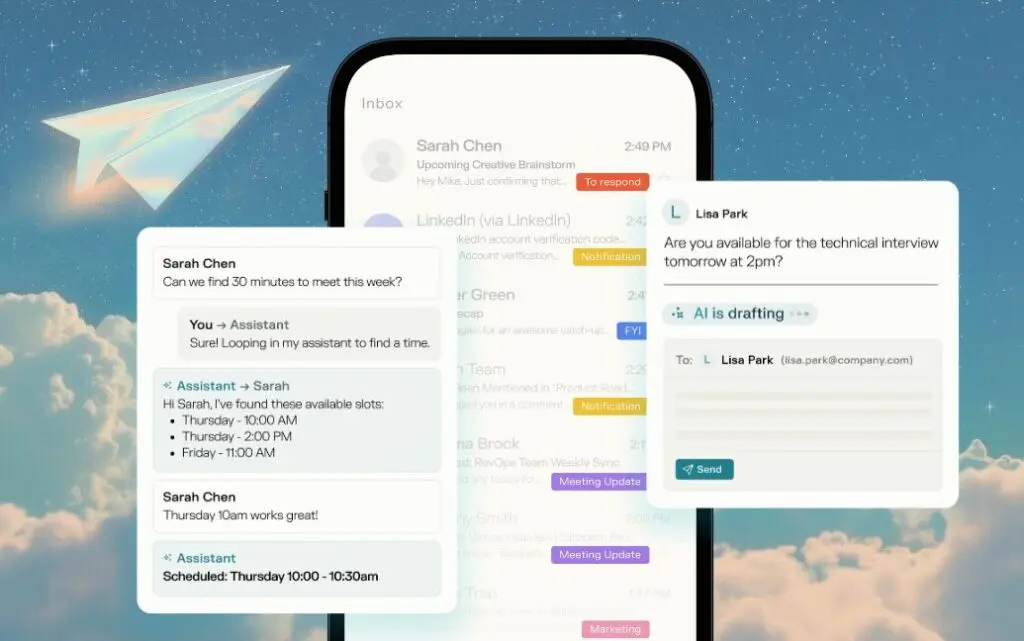- Perplexity launches Email Assistant, available only to $200/month Max subscribers, bringing AI-driven inbox automation to Gmail and Outlook.
- Designed for enterprise workflows, it handles drafting replies, scheduling, and prioritizing emails—positioning itself as a direct rival to Google and Microsoft productivity tools.
- AI agent functionality marks a shift beyond chatbots, enabling autonomous multi-step execution of tasks rather than isolated responses.
- Privacy concerns remain, as the assistant requires deep email and calendar access, though Perplexity stresses SOC 2 and GDPR compliance.
- Market implications: A bold push into workplace automation, but its high cost and limited availability may slow mass adoption.
Expands its Max-tier offerings with workflow automation for enterprise users.
Perplexity has made its name as a challenger in the AI search space. Now, the company is moving aggressively into workplace automation with the launch of Email Assistant, a Max-exclusive tool that promises to handle the daily deluge of corporate communications.
Introducing Perplexity Assistant.
Assistant uses reasoning, search, and apps to help with daily tasks ranging from simple questions to multi-app actions. You can book dinner, find a forgotten song, call a ride, draft emails, set reminders, and more.
Available on Play Store. pic.twitter.com/UHdUIiDOzD
— Perplexity (@perplexity_ai) January 23, 2025
At $200 per month, the product signals that Perplexity is targeting enterprise users rather than consumers, embedding AI directly into critical workflows where time saved translates into measurable business value.
The Core Functionality: Inbox to Action
At its heart, Email Assistant is designed to transform inboxes into productivity engines. The system integrates with Gmail and Outlook, automatically triaging messages, assigning smart labels, and surfacing priorities. Beyond organizing, it drafts replies that mimic the user’s communication style and manages back-and-forth scheduling by checking calendars and proposing meeting times.
Perplexity describes it as a personal assistant rather than a tool, emphasizing that the assistant adapts to user tone and patterns over time. By embedding itself into email threads, it automates one of the most resource-intensive tasks for knowledge workers—routine correspondence and meeting logistics.
Why Enterprise, Why Now
The $200 monthly pricing makes Email Assistant one of the most expensive AI productivity tools on the market, but the strategy is deliberate. As Perplexity positions itself against entrenched giants like Google and Microsoft, its bet is that enterprise buyers will pay premium prices for measurable efficiency gains.
CEO Aravind Srinivas previously stated that AI agents should be able to “automate two jobs with one prompt,” and Email Assistant is designed to embody that philosophy. The product is less about convenience for individual users and more about unlocking scalability for professionals and teams bogged down by administrative tasks.
Check out the Perplexity AI’s Deep Research Tool: Free, Fast, and a Game-Changer for In-Depth Analysis
Privacy and Security Questions
AI access to corporate email is not without risk. To function, Email Assistant requires extensive permissions: reading, drafting, sending, and scheduling within accounts. This level of control has sparked concerns over security and data privacy, especially in enterprise settings where sensitive information is handled daily.
Perplexity has sought to address these concerns by emphasizing that emails are never used to train models, while all interactions are governed by SOC 2 and GDPR compliance.
“Your inbox deserves the same intelligent partnership as your workflow, without compromising trust,”
The company said at launch. Still, the tension between utility and risk will determine adoption in highly regulated industries.
The Rise of AI Agents
Email Assistant represents a broader shift in the AI industry: the rise of autonomous agents that go beyond single-answer chatbots. Unlike a query-based system, agents manage ongoing, multi-step tasks, from responding to clients to coordinating schedules.
OpenAI, Google, and Microsoft are all moving in this direction, but Perplexity’s strategy is different. By narrowing focus to email—the single most time-consuming activity for many professionals—it is betting that owning one wedge in the workflow could provide an entry point into wider enterprise adoption.
Market Implications and Competitive Pressure
By tying automation directly into Gmail and Outlook, Perplexity is not just offering a new product but challenging the foundations of productivity software. If the assistant proves reliable, it could reshape how businesses view email management, turning inboxes from bottlenecks into action-oriented systems.
But adoption may be hampered by the steep Max-only price tag and concerns about reliability. Early tests of similar AI features have shown agents to be helpful for routine tasks but prone to mistakes with complex or sensitive requests. For businesses, a single error in email handling could outweigh the promised efficiencies.
A High-Stakes Entry into Enterprise AI
Perplexity’s Email Assistant marks its boldest expansion yet into enterprise AI, placing email at the center of its strategy. The move highlights a growing recognition that automation will define the next wave of workplace tools—but also underscores the challenges of trust, adoption, and differentiation in a crowded field.
The ultimate question is whether enterprises will see $200 per month as a justifiable investment in reclaimed productivity—or whether the assistant becomes another experiment in the ongoing AI arms race.


